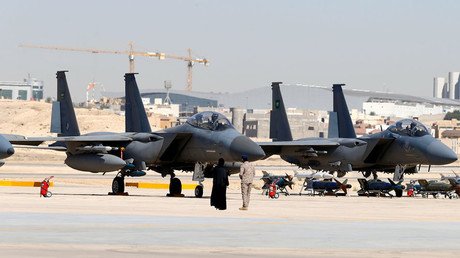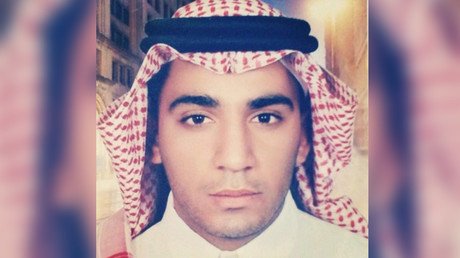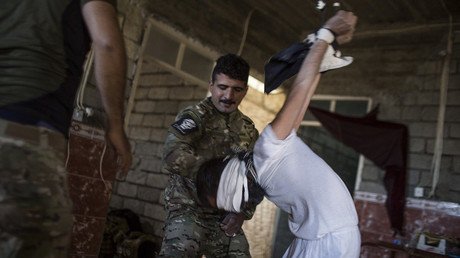UAE has secret torture prisons in Yemen, US involved in interrogations – AP
The UAE operates a network of ‘black sites’ in war-torn Yemen, where terrorist suspects are abused and tortured, an AP investigation has found. US personnel have been involved in at least some interrogations, agency sources said.
There are at least 18 clandestine prisons across southern Yemen operated by the United Arab Emirates (UAE) or by Yemeni forces created and trained by the Arab nations, AP reported on Thursday. A number of the estimated 2,000 detainees there are subjected to abuse and torture and have no legal protection, sources from the agency said.
The US military provides lists of questions for the detainees and receives transcripts of the interrogations done at the black sites, potentially making America complicit in torture. American citizens have been directly involved in some of the interrogations, although none of the sources confirmed participation in the alleged abuses, the report said, citing several unnamed US defense officials.
AP interviewed dozens of people for the report, including former inmates, family members of people held in detention, lawyers, Yemeni and US officials. Most of the sources spoke to the agency on condition of anonymity, either fearing reprisals or because they were not authorized to discuss the issue.
The UAE is part of a Saudi Arabia-led coalition of nations which, in March 2015, started an air campaign against Houthi rebels who earlier ousted Yemeni President Abed Rabbo Mansour Hadi. The US is providing assistance to the coalition by refueling its warplanes and giving intelligence information.
Amid the civil war, the local branch of Al-Qaeda, the AQIP, was emboldened. The UAE-operated secret prisons uncovered by AP in Yemen are intended for suspected members of the terrorist organization. The black sites are based at military bases, including across the sea in Eritrea, ports, an airport, private villas and even a nightclub.
Former inmates told the agency how they were put into shipping containers and even smeared with feces. Inmates were flogged with wires, locked inside a container with a fire burning to fill it with smoke, tied to a spit and spun in a circle of fire, as well as being subjected to other forms of torture.
“We could hear the screams,” said a former detainee, who spent half a year in a prison located at Riyan airport near the city of Mukalla, eastern Yemen.
He claimed that “almost everyone is sick” while the remaining are “near death.” According to the man, in case of even the slightest complaint a prisoner “heads directly to the torture chamber.”
While the US officials quoted by AP maintained that there was no knowledge of American personnel involved in the direct abuses, a member of the Yemeni special unit (Hadramawt Elite), which was created by the UAE, claimed US forces were sometimes just yards away.
The UAE-trained special operations unit overtook Mukalla from the Al-Qaeda branch in 2016. After that, some 400 people were rounded up in the area over alleged ties with AQIP.
The coalition-backed Yemeni government has little say in what happens in the coastal city, AP reported. Even in the city of Aden, where the Yemeni supporters of the Hadi government have a powerbase, UAE-backed troops have a strong presence and operate what the agency calls a “state-within-a-state.” They control half of a prison in the district of Mansoura and a military base called Bier Ahmed.
Several Yemeni officials said Americans were conducting interrogations of terrorist suspects on ships off the Yemeni coast. One said he had witnessed detainees being brought in for questioning to a ship where he was serving at the time, adding that he was told that the interrogation was conducted by American experts.
Several US defense officials told AP the Pentagon investigated allegations of torture in Yemen.
“We would not turn a blind eye, because we are obligated to report any violations of human rights,” chief Defense Department spokeswoman Dana White said when presented with AP's findings. The official added that the US always follows “the highest standards of personal and professional conduct.”
With reference to the alleged abuse by US personnel on the ships, unnamed American officials insisted it was not the case.
The UAE government for its part denied the existence of black sites in Yemen and said no torture of inmates was carried out during interrogations. Yemeni Brig. Gen. Farag Salem al-Bahsani, commander of the Mukalla-based 2nd Military District, said the reports of torture were “exaggerated.”
The US has a historic record of abuse of terrorist suspects after the 9/11 attacks, either directly at CIA black sites in Europe or by proxy, for instance in Libya during Muammar Gaddafi’s reign.
Detainees at the Guantanamo Bay military prison were subjected to so-called “enhanced interrogation,” which human rights groups see as torture. Former President Barack Obama acknowledged the description in 2014, saying that the US “tortured some folks” at the facility.
A US-supported elite Emergency Response Division (ERD) in Iraq is currently under investigation over footage and photos of torture of suspected terrorists. The US says it had no knowledge of the abuses.
The “explosive” report of torture in Yemen requires an impartial investigation, Professor Lyal Sunga from the Raoul Wallenberg Institute of Human Rights and Humanitarian Law told RT.
“It’s not enough to rely on standard denials that we hear form either the Yemeni forces, the UAE or the US. It’s very important to have an independent, impartial, objective fact-finding mission in such situations,” Sunga emphasized.
The inquiry may be carried out by the International Committee of the Red Cross or the UN Human Right Council’s Special Rapporteur against Torture, he added.
With fighting terrorism being paramount in the international community, intelligence sharing between the US and Yemen “is to be expected and it’s a good thing,” the professor said.
“But one has to be very careful [when it comes to interrogation]. I don’t think it’s enough to say: ‘Well, you know, we didn’t torture… we’re not personally, directly, hands on involved.’ Under the convention against torture, if you’re part of the process of the interrogation – even if you don’t do it yourself – if you’re complicit in some way it could import legal responsibly under international law,” he underlined.















